Jan C. Blok Jr.
| Jan C. Blok Jr. | |
|---|---|
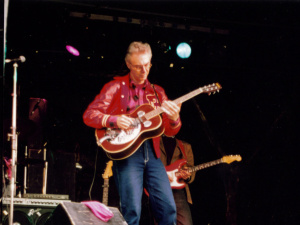 Jan C. Blok jr. during the Vrijbuiter Frestival (1991) in Goes. | |
| Geboren | 27 August 1943 Kruiningen |
| Overleden | 21 June 2006 Kloetinge |
| Beroep | Musician |
| VIAF | [1] |
Jan Blok was a renowned musician from Zeeland. He was well known for his singing and rough vocal style, and was also a multi-instrumentalist: he played the guitar, harmonica, and piano. His musical style draws influence from a variety of genres, including rock’n roll, blues, and country music. Much of his discography and repertoire also demonstrates aspects of jive music and rockabilly (a fusion between hillbilly and country music).
Career
Largely owing to his broad interest in music, Blok’s career included work as both a band member and a solo artist. He played in numerous bands, including the Shakin’ Stevens and the Sunsets, The Flying Electra’s, Rocky West and the Humbuggers, and Delta Blues Band. From this it can be seen that his musical career was marked by much variety, but not quite longevity: each stint with an individual band normally lasted only a few years. When discussing his experience working in musical groups, Blok stressed the importance of a shared basis for musical vision: “If a group doesn’t have a good foundation, it will not work out, you just have to work very hard for it.” As a solo artist he produced an LP in English, and also sang in Zeeland dialect. His song Heboorn Voe ‘ t Geluk reached the 14th place in the Zeeland Top-40 in 2007. Widely referred to as a “ rock maniac,” Blok’s diverse experiences and widespread musical involvement left a significant impact on modern popular music throughout the province of Zeeland.
Early Years
Blok was born in Kruiningen into a family with strong musical background: his father played the harmonica, as did his sister. His brother played both the violin and the clarinet. It was around the time when Blok began to show an interest in playing the guitar that it became apparent to his family and family friends that he displayed an unusual interest and devotion to music, especially for most children his age. It is said that Blok’s mother was continually puzzled at why her son spent more time playing the guitar than socializing or ‘chasing girls’. In a later interview Blok confessed that back then, he would often turn on Radio Luxemburg which would broadcast Rock’ n’ Roll music, which he thought much more beautiful than all girls put together.
Blok was exposed to different influences from a young age, because of his father’s profession. His father had been a truck driver, and so young Blok had the opportunity to absorb many influences from big cultural cities, such as Brussels. According to him, this gave him an “information advantage” in comparison with his peers, who, according to him, always thought that Jan was a bit a weird. However, these little trips abroad were not what influenced Blok the most when it came to his musical career. According to him, country music group ‘The Moluccans’ were responsible for much of his musical inspiration. At age 12, he heard their country performance and was extremely enthusiastic and taken off guard by the performance. Blok describes himself as delighted with the sound because, in his opinion, it was so much richer than the “plain” Dutch music from that time. At this point he decided to buy a guitar so that he could begin to emulate the “magical” sound of The Moluccans . Together with Dook Kopmels he started a band called The Rocking Devils. Interestingly, despite many members of his family also being involved in music, Blok did not receive much support from his parents in his pursuit of a music career. Far from being enthusiastic about his musical inspiration, his parents were concerned about the drop in his grades. Thus, under increasing pressure form his parents and in order to keep peace at home, Blok refocused on completing school and put his aspirations for a musical career on the backburner.
Turning Point
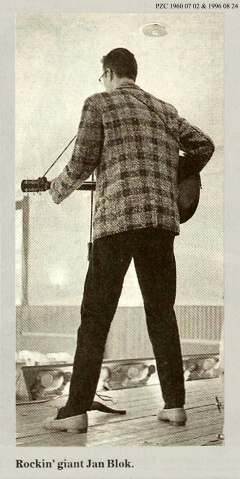
It was not until the early 60s that Blok decided it was time for him to reconnect with his musical roots. He participated in numerous talent shows, and in the end received the opportunity to play as one of the support acts for musician Willy Alberti in Kruiningen. At this point and after relative success as the opening act, Blok chose to travel to Brugge with his band, The Flying Electras for a performance. Upon his return, he learned that his father had committed suicide in his absence, which would bring upon him a period of grief and guilt for several years.
Career
By 1967, Jan Blok appeared to have found some consistency in a wife, a daughter, and a job as an elementary school teacher at the Theo Thijsenschool in Zierikzee. In addition to his official occupation, he acted as the unofficial harmonica player with The Shakin’ Stevens and Sunsets. After a few years, in March 1969, his wife asked for a divorce and took their two year old daughter, Ody, with her. Following this destabilizing life event, Blok became depressed, failed to show up regularly at his job, and was thus fired from his job at the Zierikzee school. In addition to his absences, Blok was often known to neglect his duties in teaching the children grammar, and instead teach them to play the guitar. After briefly moving to Utrecht, he moved back to Zeeland. He then settled in Hansweert, where he began to live in solitude, largely cut off from all contact with his musical acquaintances from earlier in his musical life. His performances during this period were quite sporadic; Jan would occasionally respond to calls from old friends who wanted the old ‘wild child’ back. One example of this was the phone call made by Mac Bouvrie in 1975, who was the owner of the MAC-label. He asked whether or not Blok felt motivated to play with Little Richard on the 16th of June. Together with the rest of Rocky West and the Humbuggers (one of the many bands Blok played in) in the Vorst Nationaal, Brussels. After this performance, Blok’s return to a solitary lifestyle was even more absolute than it had been previosusly: he unplugged all connections he had to the outside world, which, for Jan, also meant a literal unplugging of his phone cable. Blok used his time alone as the framework for an immersive music project: he worked on a solo LP that was published in 1981: What Loneliness Can Do. The record was largely recognized as a project revealing and discussing the various losses he had suffered in his life. This was evident in the first track, (Ody You’ re my Baby) and the last song (Ody I’ m Waitin’ On You), both narrating his longing for reconnection with daughter. In 1989 the LP was rated within the top ten of best LP’ s by the VPRO show Stompin’. The record is still a collector’s item within Rockabilly circles.
During an interview in 1992, Blok expressed his feeling that life had finally begun to look brighter. He confessed how much crisis centers helped him and how his daughter had reconnected with him, in 1988. He had decided that money did not matter in life, and that one should try to see the positive side of everything. Even though at this point he was living on welfare, and he had neither a job nor the prospective on a new LP, he did have a daughter and a life companion: and for Jan, that was enough.
Final Years
On June 21st, 2006, Blok was found dead in his home in Kloetingen, at the age of 62. That same year, a tribute was organised, and would be so every five years later from 2011. Musicians like Peter Kempe, Jan van den Berg and Champagne Charlie all gathered to honour Blok and played music the way he would have loved it. They all gathered to acknowledge Blok’ s pioneering role in the modern music of Zeeland.
Discography
- What Loneliness Can do (1981)
- Born for Good Luck / Drink without Care (1986)
- Southern Lovers (1993)
- Heboorn Voe’t Geluk (2001)
- Nature (2005)
- Merry X-Mas (2005)
Live Example
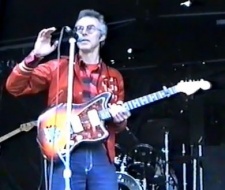
Author
-Marlin Wagtmans (UCR), 2012
Editors
Jordan Scott (UCR), 2017 Sabine Pendry (UCR), 2017
Resources
- Feij, Flip; Bareman, Wout, ‘Jan Blok is rockgek en doet er alles voor’, in: PZC 2 juni 1973, pag. 17.
- Dreu, René de, ‘Een Zeeuwse solist in de wereld van rock 'n roll, blues en rockabilly’, in: PZC 12 oktober 1991, pag. 42.
- Balkenende, Frank, ‘Tegenwoordig studeer ik voor mens’, in: PZC 3 maart 1992, pag. 21.
- ‘Zeeuwse Pionier van Rock-'n-Roll Overleden’, in: PZC 23 juni 2006, pag. 32.
- ‘Streektaalmuziek in Zeeland’ 21 juni 2011.
- ‘Eerbetoon aan Jan Blok’ juni 2011.
- Kuipers, Jan J.B; ‘Brommers, Gitaren En Spandoeken’ ISBN 90 5994 093 8 Uitgeverij Aprilis -Zaltbommel © 2005.
EN| Engelse vertaling / English translation]]
| Blok, Jan C. Jr., Jan Blok
(Kruiningen 27 augustus 1943 – Kloetinge 21 juni 2006) Muzikant |
|---|
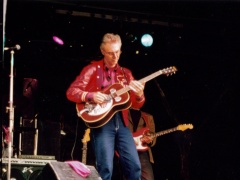
Jan Blok was een vermaarde musicus uit Zeeland. Hij bespeelde de gitaar, harmonica, piano, en was bovendien bekend door zijn ruige stem met karakter. Zijn muzikale genre omvat rock’n roll, blues, country, maar ook jive muziek en rockabilly (een mix tussen hilbilly en country muziek).
Carrière
Het bleek voor Blok erg moeilijk te zijn om te kiezen tussen een bestaan als solo musicus of als lid van een band. Hij speelde in een groot aantal bands waaronder Shakin’ Stevens and the Sunsets, Ramses & the Archers, What Bums, Rocky West and the Humbuggers, Delta Blues Band. Volgens Blok had een band een zekere basis nodig die erg sterk moet zijn. Zonder deze basis, het harde werk, zou een band nooit succesvol kunnen zijn. Als soloartiest kwam Blok in 1981 met een LP vol Engelse werken. Blok zong ook in het Zeeuws dialect: in 2007 drong het liedje “Heboorn Voe ’t Geluk” (Een hertaling van het singeltje "Born for Good Luck" uit 1986) door tot de 14de plaats in de Zeeuwse top 40. De 62 jaar die de musicus doorbracht op deze wereld zijn chaotisch, doch gedenkwaardig geweest. Blok heeft wel degelijk zijn invloed achter gelaten op het Zeeuwse muziekleven.
Jeugd
Al op jonge leeftijd, opgroeiend in Kruiningen, werd Blok blootgesteld aan verschillende muzikale invloeden. Zijn vader speelde de harmonica, net als zijn zus. Bovendien speelde zijn broer zowel viool als klarinet. Wanneer Blok interesse toonde voor het spelen van gitaar merkte de Kruiningse gemeenschap dat hij anders was dan zijn leeftijdsgenootjes. Zijn moeder had soms moeite met het begrijpen van haar zoon: welke jongen speelt nu liever gitaar dan dat hij achter de meiden aanzit? In een later interview bekende Blok dat hij vaak naar Radio Luxemburg luisterde, en genoot van de ruige rock’n roll songs. Volgens hem was deze muziek vele male mooier dan alle meisjes bij elkaar.
Een tweede oorzaak van Bloks bijzondere jeugd was zijn vaders beroep. Deze was vrachtwagenchauffeur en nam zo nu en dan zijn zoon mee; zo zag Jan Blok veel van de wereld. Hij had hierdoor de kans om de sfeer van wereldsteden als Brussel te absorberen. Volgens Blok gaf dit hem een ‘informatie voorsprong’ in vergelijking met zijn klasgenootjes, die hem nogal een rare vogel vonden.
Deze buitenlandse tripjes zijn niet de gelegenheden geweest waar Blok zijn muzikale inspiratie vond. Volgens hem waren het de Molukkers die elke zondag in de kerk muziek maakten, die zijn eerste inspiratiebron vormden. Hij was slechts 12 jaar oud toen hij hen voor het eerst countrymuziek hoorde spelen. Hij geloofde zijn oren niet; nog nooit had hij zo’n mooi geluid gehoord in de Nederlandse muziek. Hij besloot een gitaar te kopen met de 25 guldens die hij bezat: hij wilde het magische geluid dat de Molukkers produceerden maar al te graag nabootsen. Samen met Dook Kopmels startte hij een band genaamd: ''The Rocking Devils'' die na 3 maanden verder ging als ''Ramses & the Archers''. Die bestond behalve uit Blok en Dook uit Henk Kole, Tony Klink en Rinus Sohier. Zij waren een tijdlang de huisband van het Vlissingse Concertgebouw, waar ze instrumentale gitaarmuziek (the Shadows, Electric Johnny en eigen nummers) afwisselden met de zangnummers geschreven door Blok. In 1959 wonnen ze een talentenjacht van Phonogram voor Zeeland en Brabant, waarna ze optraden in de landelijke finale in het Concertgebouw in Amsterdam. Niet zij maar Rob de Nijs wonnen de eerste prijs. Blok zelf was erg enthousiast over deze ontwikkelingen, hoewel zijn ouders er anders over dachten. Het enige wat zij zagen was een zakkend cijfergemiddelde op school. Om de vrede aan het thuisfront te bewaren besloot Blok zijn muzikale carrière op een laag pitje te zetten.
Keerpunt

Tot aan het begin van 1960 hield Blok zich gedeisd, totdat hij besloot mee te doen aan tal van talentenshows. Dit alles resulteerde uiteindelijk in een rol voor hem én Ramses & the Archers in het voorprogramma van Willy Alberti in Kruiningen. Blok voelde zich zó goed en zelfs aangemoedigd door zijn familie dat hij doorsloeg: hij vertrok van de hak op de tak naar Brugge met zijn volgende band ''The Flying Electra’s'' voor een optreden. Toen hij terugkwam in Kruiningen kwam hij erachter dat zijn vader zelfmoord had gepleegd. Dit veroorzaakte een schuldgevoel wat hem nog vele jaren zou achtervolgen.
Kluizenaarsbestaan
In 1967 leek Blok voor de naïeve buitenstaander een typisch huisje-boompje-beestje leven te hebben: een vrouw, dochter, en baan als basisschoolleraar bij de Theo Thijsenschool in Zierikzee. Achter dit burgerlijke plaatje verschool Blok zijn ware persoonlijkheid: onofficiële harmonica speler bij de opkomende band ''Shakin’ Stevens en de Sunsets''. Na een paar jaar, in maart 1969, was zijn vrouw het wilde leven van haar man zat, ze vroeg een scheiding aan, en eveneens de voogdij over hun tweejarige dochtertje Ody. Hierna werd Blok leraar in Utrecht, de assertieve stadkinderen plus de stress van zijn scheiding werden hem echter te veel. Na een burn-out en psychiatrische behandeling werd hij afgekeurd voor het onderwijs. Blok probeerde alles op orde te stellen in Utrecht, maar verlangde toch weer terug naar zijn Zeeuwse roots. Hij probeerde opnieuw te beginnen in Hansweert waar hij een kluizenaarsbestaan leefde. Soms werd hij uit dit isolement gehaald door kennissen die de goede oude muzikale Jan weer tevoorschijn wilden halen. In 1975 kreeg Blok een telefoontje van Mac Bouvrie, destijds de eigenaar van het MAC-label was. Hij vroeg Blok of hij wilde optreden met een van zijn oude bandjes, ''Rocky West and the Humbuggers'', als voorprogramma voor ''Little Richard'' in de Vorst Nationaal te Brussel. Na dit succesvolle optreden besloot Blok weer terug te keren naar zijn eenzame levensstijl. Hij sloot zich volledig af voor de buitenwereld en dit resulteerde in een LP in 1981: ''What Loneliness can do''. Deze plaat vertelt over het gemis van Ody, zijn dochter. Zowel het eerste nummer (Ody You’re my Baby) als het laatste (Ody I’m Waitin’ On You) getuigt van een groot gemis. In 1989 belandde de LP in de top 10 van beste LP’s bij het VPRO programma ''Stompin’''. De plaat is vandaag de dag nog steeds een verzamelitem binnen Rockabilly-kringen.
In een interview in 1992 wist Blok te melden dat zijn leven er en stuk beter uitzag. Hij gaf toe dat vele crisiscentra hem hadden geholpen zijn leven weer op orde te brengen. Zijn dochter had weer contact met hem opgenomen in 1988. Hij had besloten dat geld niet het belangrijkste op de wereld was, en dat je met een positieve houding erg ver kon komen. Hij mocht dan wel leven van een uitkering, zonder baan, en zonder enige hoop voor een nieuwe LP, maar hij had zijn dochter en levenspartner: dat was genoeg voor nu. Samen met zijn levenspartner kreeg hij nog een zoon Alan.
Invloed
Op 21 juni 2006 werd Blok op 62 jarige leeftijd levenloos aangetroffen in zijn huis te Kloetinge. Nog datzelfde jaar werd een herdenkingsconcert gegeven, vijf jaar later werd dit herhaald. Muzikanten zoals Peter Kempe, Jan van den Berk, en de band Champagne Charlie kwamen allemaal samen om een hommage te brengen aan deze grote muzikant en pionier op het gebied van moderne muziek in Zeeland.
Discografie
- What Loneliness Can do (1981)
- Born for Good Luck / Drink without Care (1986)
- Southern Lovers (1993)
- Heboorn Voe’t Geluk (2001)
- Nature (2005)
- Merry X-Mas (2005)
Live optreden
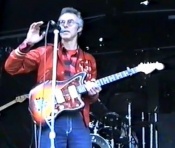
<<< Live opname van Jan C. Blok jr. in Goes, Bocht van Guinea, Vrijbuiterfestival, 8 juni 1991, bron: Youtube.
Auteur
-Marlin Wagtmans (UCR), 2012
Editor
Margot Polderdijk (UCR), 2017
Weblinks & Literatuur
- Feij, Flip; Bareman, Wout, ‘Jan Blok is rockgek en doet er alles voor’, in: PZC 2 juni 1973, pag. 17.
- Dreu, René de, ‘Een Zeeuwse solist in de wereld van rock 'n roll, blues en rockabilly’, in: PZC 12 oktober 1991, pag. 42.
- Balkenende, Frank, ‘Tegenwoordig studeer ik voor mens’, in: PZC 3 maart 1992, pag. 21.
- ‘Zeeuwse Pionier van Rock-'n-Roll Overleden’, in: PZC 23 juni 2006, pag. 32.
In verband met een auteursrechtenkwestie zijn artikelen van na 1940 in de krantenbank tijdelijk niet on-line.
- ‘Streektaalmuziek in Zeeland’ 21 juni 2011.
- ‘Eerbetoon aan Jan Blok’ juni 2011.
- Kuipers, Jan J.B; ‘Brommers, Gitaren En Spandoeken’ ISBN 90 5994 093 8 Uitgeverij Aprilis -Zaltbommel © 2005.